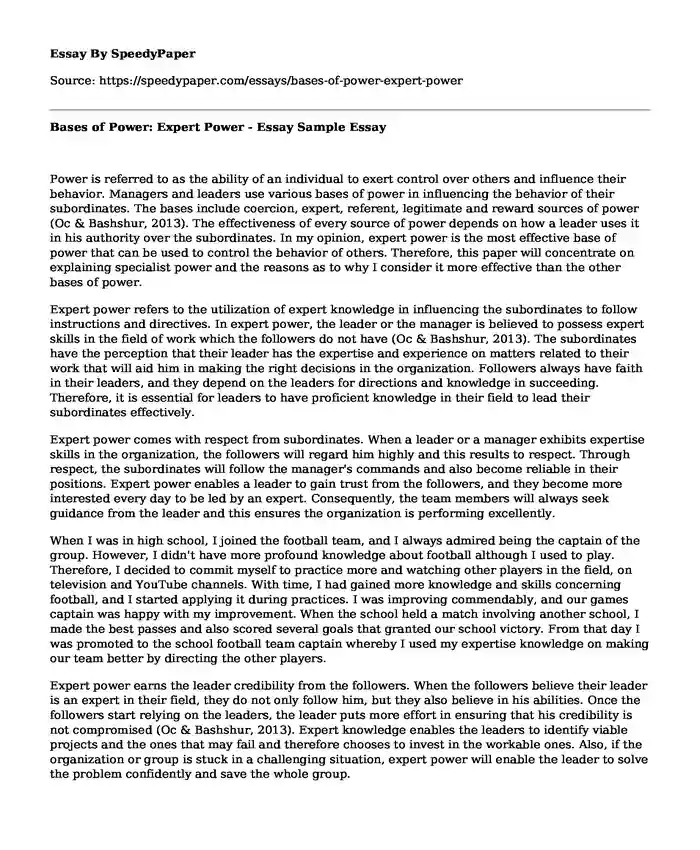
| Type of paper: | Essay |
| Categories: | Knowledge Human resources Personal leadership Leadership development |
| Pages: | 3 |
| Wordcount: | 669 words |
Power is referred to as the ability of an individual to exert control over others and influence their behavior. Managers and leaders use various bases of power in influencing the behavior of their subordinates. The bases include coercion, expert, referent, legitimate and reward sources of power (Oc & Bashshur, 2013). The effectiveness of every source of power depends on how a leader uses it in his authority over the subordinates. In my opinion, expert power is the most effective base of power that can be used to control the behavior of others. Therefore, this paper will concentrate on explaining specialist power and the reasons as to why I consider it more effective than the other bases of power.
Expert power refers to the utilization of expert knowledge in influencing the subordinates to follow instructions and directives. In expert power, the leader or the manager is believed to possess expert skills in the field of work which the followers do not have (Oc & Bashshur, 2013). The subordinates have the perception that their leader has the expertise and experience on matters related to their work that will aid him in making the right decisions in the organization. Followers always have faith in their leaders, and they depend on the leaders for directions and knowledge in succeeding. Therefore, it is essential for leaders to have proficient knowledge in their field to lead their subordinates effectively.
Expert power comes with respect from subordinates. When a leader or a manager exhibits expertise skills in the organization, the followers will regard him highly and this results to respect. Through respect, the subordinates will follow the manager's commands and also become reliable in their positions. Expert power enables a leader to gain trust from the followers, and they become more interested every day to be led by an expert. Consequently, the team members will always seek guidance from the leader and this ensures the organization is performing excellently.
When I was in high school, I joined the football team, and I always admired being the captain of the group. However, I didn't have more profound knowledge about football although I used to play. Therefore, I decided to commit myself to practice more and watching other players in the field, on television and YouTube channels. With time, I had gained more knowledge and skills concerning football, and I started applying it during practices. I was improving commendably, and our games captain was happy with my improvement. When the school held a match involving another school, I made the best passes and also scored several goals that granted our school victory. From that day I was promoted to the school football team captain whereby I used my expertise knowledge on making our team better by directing the other players.
Expert power earns the leader credibility from the followers. When the followers believe their leader is an expert in their field, they do not only follow him, but they also believe in his abilities. Once the followers start relying on the leaders, the leader puts more effort in ensuring that his credibility is not compromised (Oc & Bashshur, 2013). Expert knowledge enables the leaders to identify viable projects and the ones that may fail and therefore chooses to invest in the workable ones. Also, if the organization or group is stuck in a challenging situation, expert power will enable the leader to solve the problem confidently and save the whole group.
In conclusion, power comes in various bases such as coercion, referent, expert, legitimate and reward power. The success of every group or organization depends on the base of power the leaders or managers use to influence the subordinates. However, I believe expert power is the most effective base of power as it is earned through the leader's expert knowledge and skills. Expert power allows the leader to gain trust and credibility from the subordinates and this makes it easier for him to give directions.
References
Oc, B., & Bashshur, M. R. (2013). Followership, leadership, and social influence. The Leadership Quarterly, 24(6), 919-934.
Cite this page
Bases of Power: Expert Power - Essay Sample. (2022, Dec 30). Retrieved from https://speedypaper.net/essays/bases-of-power-expert-power
Request Removal
If you are the original author of this essay and no longer wish to have it published on the SpeedyPaper website, please click below to request its removal:
- Juvenile Corrections Essay Example
- Free Essay: Contrast Between Angela Whitiker's and Mr. Peralta's Ways to Success
- Free Essay on Nike Aquiring Lululemon
- Computer Technology in Early Childhood Education, Essay Example
- Creative Writing Essay on Slavery in United States
- Mortgage Securities Market Essay Sample
- Ocean-Ocean Convergence - Free essay
Popular categories




